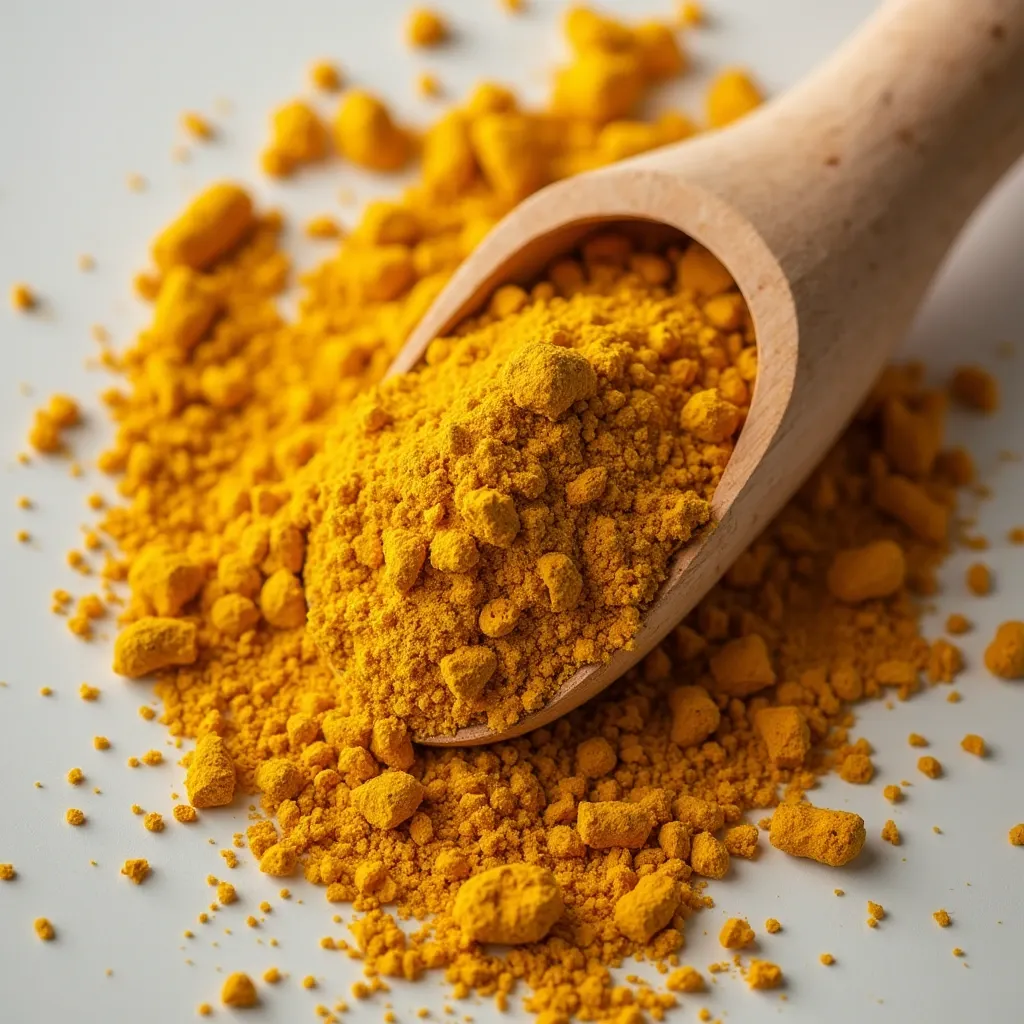How is turmeric used as a remedy for knee pain?
Struggling with knee pain? Discover how turmeric can naturally reduce inflammation, ease pain, and support joint health. Learn simple ways to incorporate this golden spice into your routine for lasting relief and improved mobility. Don’t miss out on this powerful natural remedy!
Knee pain is something many of us experience, whether it’s due to an injury, arthritis, or just the wear and tear that comes with age. If you've been on the lookout for a natural way to ease your knee pain, then turmeric might just be your golden ticket. Known for its powerful anti-inflammatory properties, turmeric, specifically its active ingredient curcumin, can work wonders in reducing inflammation, soothing pain, and supporting overall joint health. But how exactly does turmeric help with knee pain, and how can you use it in your daily routine? Let’s dive in and find out!

What Makes Turmeric a Game Changer for Knee Pain?
Turmeric isn’t just a kitchen spice; it’s a powerhouse for health. When it comes to joint pain, especially in the knees, turmeric has earned its reputation as a natural remedy. The secret lies in curcumin, the compound that gives turmeric its bright yellow color and is responsible for many of its health benefits. Curcumin is packed with anti-inflammatory, antioxidant, and pain-relieving properties that make it an excellent ally in the fight against knee pain.
Curcumin: The Magic Behind Turmeric
Curcumin is the main active ingredient in turmeric, and it’s what makes turmeric so beneficial for joint pain. One of its primary effects is its ability to reduce inflammation, which is often the root cause of joint discomfort. When your knees are inflamed, you may experience swelling, stiffness, and pain. Curcumin works by blocking the molecules that cause inflammation, providing relief and helping your knees feel more comfortable.
But curcumin doesn’t stop there. It’s also a powerful antioxidant that helps neutralize free radicals in the body. Free radicals are harmful molecules that can damage cells and contribute to aging and disease, including joint issues. By reducing oxidative stress, curcumin helps protect your joints and supports overall health, giving you the relief you need to stay active.
How Does Turmeric Help With Knee Pain?
1. Reduces Inflammation
Inflammation is one of the main culprits behind knee pain. Whether it's arthritis, an overuse injury, or a recent trauma, inflammation can make your knees feel stiff, swollen, and painful. Turmeric’s anti-inflammatory properties, thanks to curcumin, can reduce this inflammation, providing relief and helping restore mobility.
Imagine you’ve been dealing with knee pain from osteoarthritis. Every step feels like a chore because of the swelling and stiffness in your knee. You start adding turmeric to your daily routine, either in your food or as a supplement, and over time, you notice a reduction in swelling and less discomfort when you walk. Turmeric helps reduce the inflammation that was holding you back from enjoying your daily activities.
2. Relieves Pain Naturally
Many people with knee pain rely on over-the-counter painkillers to manage their symptoms. While these medications can be effective, they often come with side effects. Turmeric offers a natural alternative that can help reduce pain without the risks associated with traditional pain relievers. Curcumin works by blocking pain-causing molecules in the body, providing relief from knee pain, whether it’s due to arthritis, injury, or overuse.
Let’s say you're recovering from a knee injury, like a meniscus tear. You’re using painkillers to manage the pain, but you’re looking for something more natural. By incorporating turmeric into your routine, you notice that your pain is more manageable without the need for as many painkillers. The anti-inflammatory properties of turmeric provide a gentle yet effective pain-relieving solution for your knee.
3. Supports Long-Term Joint Health
In addition to providing immediate relief, turmeric can also help protect your knees from further damage. Curcumin has been shown to prevent the breakdown of cartilage, which is vital for joint health. By reducing inflammation and supporting cartilage health, turmeric can help slow the progression of joint issues, especially for conditions like osteoarthritis.
If you're dealing with the early stages of knee osteoarthritis, turmeric could help slow the degeneration of your knee cartilage. Instead of allowing the inflammation to continue causing damage, turmeric provides the anti-inflammatory support your joints need to stay strong.
How to Use Turmeric for Knee Pain Relief
Incorporating turmeric into your daily routine doesn’t have to be complicated. There are plenty of ways to enjoy its benefits, whether you prefer to drink it, eat it, or take it as a supplement. Here are a few easy and delicious ways to add turmeric to your life:
1. Golden Milk: A Soothing Drink for Your Knees
Golden milk is a traditional drink made with turmeric, milk (or a plant-based alternative), black pepper, and honey. The black pepper enhances the absorption of curcumin, making it even more effective. It’s a soothing, anti-inflammatory drink that can be enjoyed any time of day.
How to make golden milk:
- 1 cup of milk (or almond/coconut milk)
- 1 teaspoon turmeric powder
- A pinch of black pepper
- Honey or maple syrup to taste
Heat the milk, add the turmeric and black pepper, and stir until well combined. Sweeten with honey or maple syrup if desired, and enjoy this anti-inflammatory drink that’s gentle on your knees.
2. Turmeric Tea: A Simple, Refreshing Option
For those who love a warm cup of tea, turmeric tea is an excellent way to incorporate this powerful spice into your routine. It’s easy to make and provides both comfort and relief for your knees.
How to make turmeric tea:
- 1 cup hot water
- 1 teaspoon turmeric powder
- Honey or lemon for flavor
Steep the turmeric powder in hot water for about 5 minutes, then add honey or lemon to taste. This tea is perfect for sipping before bed or as an afternoon pick-me-up.
3. Turmeric Supplements: Convenient and Concentrated
If you’re finding it difficult to incorporate turmeric into your meals, turmeric supplements are a convenient option. These supplements contain a concentrated form of curcumin, and many also include black pepper extract to enhance absorption. When choosing a turmeric supplement, look for one that contains at least 95% curcumin for maximum effectiveness.
If you’re always on the go and don’t have time to prepare turmeric drinks or meals, taking a turmeric supplement can help ensure you’re getting the benefits of curcumin every day. Just be sure to talk to your doctor before starting any new supplement, especially if you have any pre-existing health conditions.
The Science Behind Turmeric for Knee Pain
Inflammation and Knee Pain: Why Turmeric Works
As mentioned earlier, inflammation is a key factor in knee pain. Whether it's from arthritis, an injury, or an overuse condition like tendinitis, inflammation causes swelling and stiffness in the joints. Turmeric’s curcumin works by blocking the molecules that cause this inflammation, providing pain relief and improving mobility.
Studies have shown that curcumin can reduce markers of inflammation in the body, making it effective for conditions like osteoarthritis and rheumatoid arthritis. In fact, research suggests that curcumin works just as well as some non-steroidal anti-inflammatory drugs (NSAIDs) in reducing inflammation, but without the potential side effects.
How Much Turmeric Should You Take?
While turmeric is generally safe to use, it’s essential to take the right dosage to experience its full benefits. For most people, a daily dose of 500 to 2,000 milligrams of turmeric extract is considered effective. If you're using turmeric powder in food or drinks, aim for around 1 teaspoon (about 2.5 grams) per day.
However, it's always best to consult with your healthcare provider before adding any new supplement to your routine, especially if you have any health conditions or are pregnant.
Turmeric’s Benefits Extend Beyond Knee Pain
Turmeric is a natural, powerful remedy for knee pain that works by reducing inflammation, easing pain, and protecting your joints. Whether you're dealing with arthritis, a recent injury, or just the aches and pains that come with aging, turmeric can help provide the relief you need to stay active and comfortable. With its anti-inflammatory, antioxidant, and pain-relieving properties, turmeric is a simple and effective solution for improving knee health.
By incorporating turmeric into your daily routine—whether through golden milk, turmeric tea, or supplements—you can support your knees naturally and enjoy a more active, pain-free lifestyle.
In addition to helping with knee pain, turmeric offers a wide range of other health benefits. From boosting brain function to supporting heart health and reducing the risk of chronic diseases, turmeric is a holistic wellness powerhouse. If you're looking for a natural way to improve your overall health, turmeric should be a part of your daily routine.
Takeaway: Don’t let knee pain hold you back. Start incorporating turmeric into your life today and experience the natural relief it offers for your joints—and so much more.
